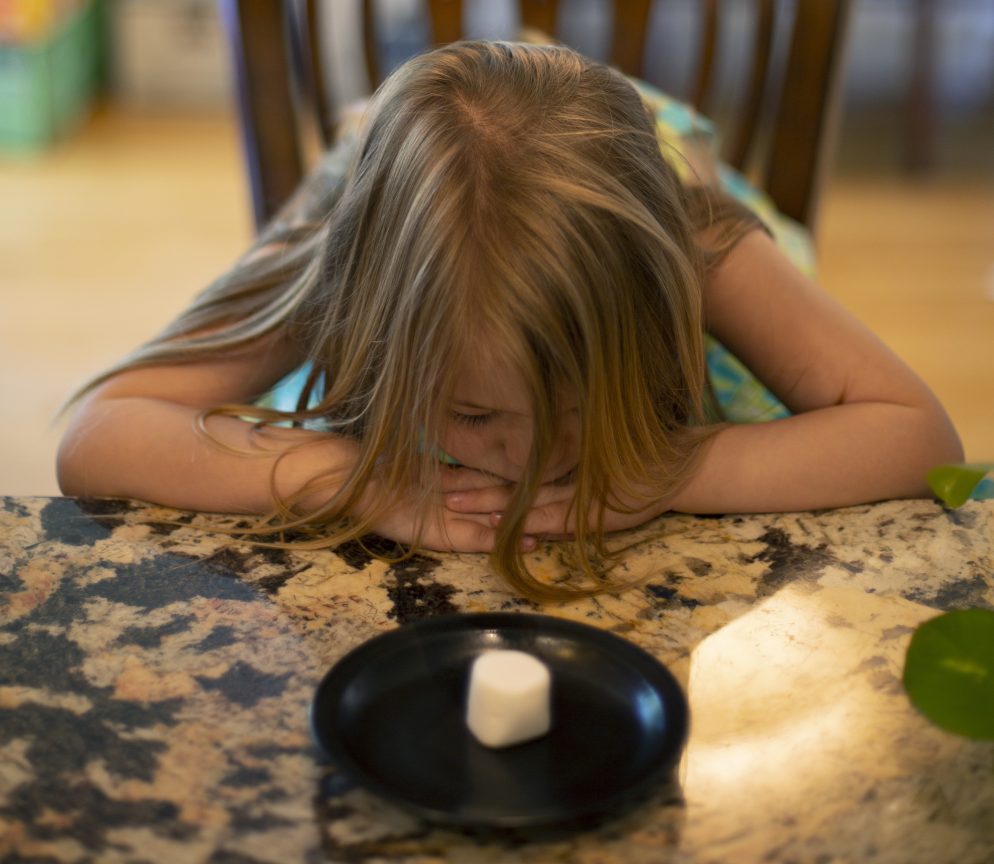Is the “marshmallow test” really a predictor of future success?

- The Stanford marshmallow test showed that preschoolers who showed patience and delayed gratification did better later in life.
- Replications of the experiment have put its predictive powers into question.
- Big Think favorite Michio Kaku weighed in, arguing the marshmallow test still has lessons to teach other than sugary soothsaying.
You know those times when you try to share a favorite movie, band, or restaurant with friends, and they just don’t get it? For mysterious reasons, you can’t refashion the moment for them as you experienced it originally. Where you found passion and insight and a life-changing creme brulee, they see just another meal served up by a sulky waiter.
For more than a decade, psychology has been enduring the institutional version of this. It’s called the replication crisis because researchers have been unable to replicate the results of many well-cited studies. And that’s a problem.
Unlike your Sunday dinner dispute—which can be neatly resolved with a fair-minded “to each their own”—scientific investigation rests on a bedrock of replication. It’s an enterprise-wide form of double-checking the work that allows science to prune false and misleading ideas from the corpus.
Not that psychology didn’t need a little trim. Thanks to a history of bad methodology, publication bias, statistical shenanigans, and overhyped conclusions, the field had grown many discoveries deserving of scrutiny. In one eye-arresting example, a study that compiled the findings of nine experiments showed that precognition was real. But it couldn’t be replicated. Neither could such popular darlings as social priming and power posing.
All told, it seems as though psychology’s replication efforts only support about half of the studies examined so far.
“[Psychologists] should admit we haven’t been producing results that are as robust as we’d hoped, or as we’d been advertising them to be in the media or to policymakers,” Simine Vazire, a psychology professor at the University of Melbourne, told The Atlantic. “That might risk undermining our credibility in the short run, but denying this problem in the face of such strong evidence will do more damage in the long run.”
But the replication crisis isn’t simply a culling. It’s revealing that human behavior is more complicated and influenced by far more than how we fold our arms in a meeting. Consider the famous Stanford marshmallow experiments, long considered a scientific fable in how self-motivation in children predicts adult successes.

A confectionary crystal ball?
Performed by psychologist Walter Mischel and then graduate student Ebbe Ebbesen in the early ‘70s, the original marshmallow studies didn’t look at success but self-control. Though the experiments varied slightly with each iteration, the basics went like this: A researcher would show a preschooler two treats, marshmallows and pretzels. The researchers would excuse themselves from the room, telling the child that they could be summoned back by ringing a bell. If the child waited for the researcher to return, they could have two of their preferred treat. If they rang the bell beforehand, they would get only one.
The researchers then left the room and observed the preschoolers. They found that children who had the initial snack within sight were much less patient than those who kept it from view. Children given toys to play with or fun activities to do fared better still. From this, Mischel and Ebbesen concluded that delayed gratification—a key component of self-control—was about developing coping strategies for the present. Focusing on future rewards only frustrated and sabotaged self-motivation efforts.
That’s cool on its own, but the marshmallow tests really seized the public’s attention when follow-up studies compared the preschoolers’ marshmallow results—few kids choose the pretzel apparently—with their later life achievements. One study found a positive correlation between the children’s impulse control and higher SAT scores. Another found a relationship between delayed gratification and a healthier body-mass index and still another showed physical differences in delayers’ prefrontal cortexes.
So it went. Studies kept confirming the marshmallow test’s predictive power. The media kept breathlessly proclaiming its virtues, while consultants repackaged its lessons for the corporate office. And a whole generation of parents stress-tested their children’s futures by leaving them languishing in front of unobtainable treats—which may explain why kids tested today can out-wait their GenX peers.
Replicating the marshmallow test
Then in 2018, a conceptual replication—that is, a study that tested the same idea but with different methods—found a much weaker correlation between childhood delayed gratification and later achievement. That correlation further disappeared when the researchers controlled for things like family background and home environment.
As before, studies kept popping up that placed the original conclusions in doubt. One found that it was less about a child’s innate ability but social trust. If a child was given reason to distrust the researcher, he or she was much more likely to nosh the unguarded marshmallow. Another study, this one co-authored by Mischel, found the marshmallow test revealed nothing about later adult behavior when looking at outcomes like capital formation or social standing.
And just as before, the media latched on to the studies with yapping headlines proclaiming the marshmallow test a failure and op-eds decrying how a whole generation had been hoodwinked out of their snacks.
Parents can help their children, not by withholding snacks but by creating environments that reward patience and are rich in trust.
Is foresight a thing of the past?
For some, the replication studies were the death knell for the marshmallow test. For others, they simply moderated the breathless hype for an adorable experiment involving children squirming for tasty ‘mallows.
In an open letter published in Psychological Science, a group of researchers argued that the 2018 study didn’t debunk the role capabilities like foresight, impulse control, and delayed gratification play in success. Rather, it showed the importance socioeconomic factors play in building and supporting them. The same goes for trust.
These replications don’t disprove the importance of what the original test showed, the letter stated. Rather, they revealed the environments and support systems that help kids build those capabilities.
That is the very attitude Mischel has always maintained. In an interview with the American Psychological Association, he threw out the notion that the marshmallow test worked like an empirical horoscope. No one, he said, is predestined or doomed. “The good news is that this cognitive and emotional skill set is eminently teachable, particularly early in life. It’s great in preschool; it’s great within the first few years of life. It’s great in adolescence even. And it continues to be a skill set that can be developed even when we’re quite mature adults.”
In a Big Think+ interview, theoretical psychologist Michio Kaku called foresight his number one criterion for success and cited the marshmallow test in support of his recommendation. Kaku openly admits that these experiments don’t prove a cause-and-effect relationship, and they often have methodological issues (such as small or homogeneous sample sizes). Nonetheless, the measurable correlation does suggest a lesson in foresight.
“The lesson is the kids who wanted two marshmallows later saw the future. They are the ones who want to plan, the ones who want to go to college, the ones who want to make something of themselves, that hold out,” Kaku said.
He added: “So, that’s why I think the measure of success is seeing the future, that is, running simulations of the future over and over again. Daydreaming. Should I go to college? Should I get a Ph.D.? Should I become this? Should I do that? Working out all the different scenarios versus the shortcut.”
Taken together, the original studies and their replications also tell us something we already knew: Human behavior is complicated and difficult to package in a pithy headline. In life, your second marshmallow isn’t always guaranteed. Some people start the game with access to more treats than others. Some have more support. And people prefer easy answers—such as some people have their self-motivation switch clicked on and others off—to the hard work of cultivating a skill.
But as a result, psychology continues to show us: An advantage to being human is that we can refine our abilities. Parents can help their children, not by withholding snacks but by creating environments that reward patience and are rich with trust. Professionals can prime their delayed gratification by adopting safeguards that are free from distraction and focus on rewards over the present moment. And leaders can develop organizations that make team members feel confident their efforts will build results everyone can share in.
Go deeper with Big Think+
Our Big Think+ lessons with Michio Kaku explore how organizations can bring science’s critical-thinking and self-motivation skills into the workplace.
- Help Your Company See the Future—and Avoid Bankruptcy
- Why We Believe in Nonsense and What You Can Do About It
- Michio Kaku’s #1 Criterion for Success in Life
Learn more about Big Think+ or request a demo for your organization today.





